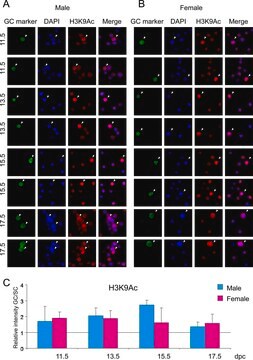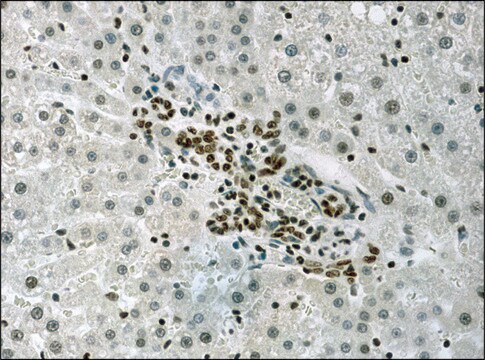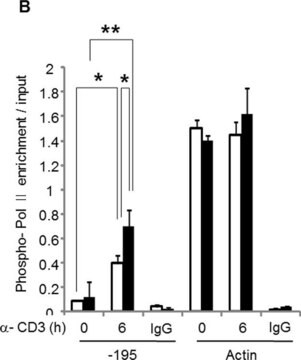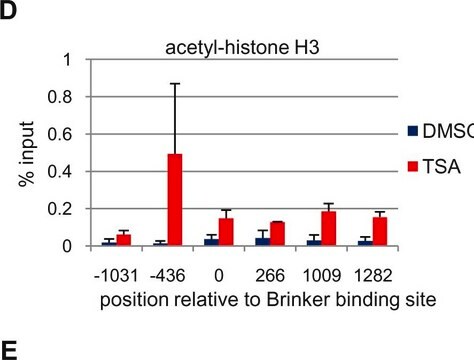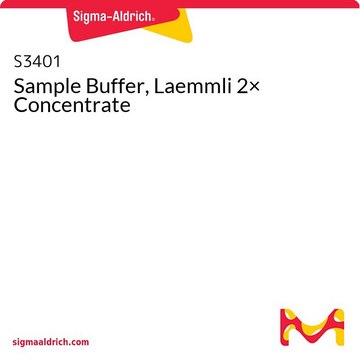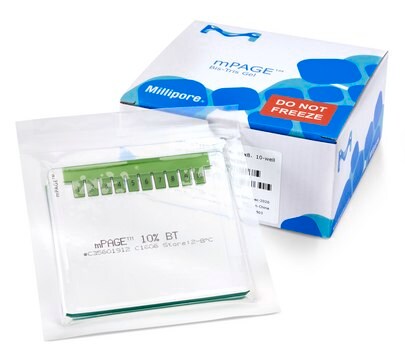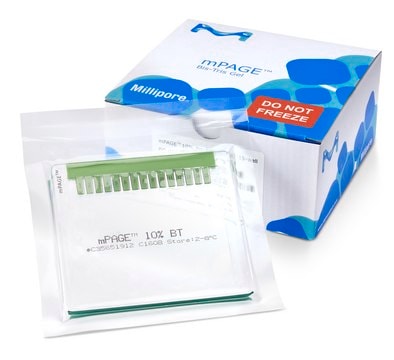17-658
ChIPAb+ Acetyl-Histone H3 (Lys9) Purified - ChIP Validated Antibody and Primer Set
from rabbit, purified by using Protein A
Synonyme(s) :
H3K9Ac, Histone H3 (acetyl K9)
About This Item
Produits recommandés
Source biologique
rabbit
Niveau de qualité
Forme d'anticorps
purified immunoglobulin
Clone
polyclonal
Produit purifié par
using Protein A
Espèces réactives
human, mouse
Réactivité de l'espèce (prédite par homologie)
mammals
Fabricant/nom de marque
ChIPAb+
Upstate®
Technique(s)
ChIP: suitable
immunocytochemistry: suitable
immunoprecipitation (IP): suitable
western blot: suitable
Numéro d'accès NCBI
Numéro d'accès UniProt
Conditions d'expédition
dry ice
Informations sur le gène
human ... H3F3B(3021)
Description générale
The ChIPAb+ Acetyl-Histone H3 (Lys9) set includes the anti-acetyl-histone H3 (Lys9) antibody, a negative control antibody (purified Rabbit IgG), and qPCR primers flanking an Sp1 binding site in the human p21 (WAF1/CIP1/CDKN1A) promoter, amplifying a 105 base pair PCR product. The acetyl-histone H3 (Lys9) and negative control antibodies are supplied in a scalable "per ChIP" reaction size and can be used to functionally validate the precipitation of acetyl-histone H3 (Lys9) associated chromatin.
Spécificité
Immunogène
Application
Sonicated chromatin prepared from untreated or UV treated (50 J/m2, 6 hrs.) U2OS cells (3 X 106 cell equivalents per IP) was subjected to chromatin immunoprecipitation using 5 μg of either a normal rabbit IgG or Anti-Acetyl-Histone H3 (Lys9) antibody and the Magna ChIP A (Cat. #17-610) Kit. Successful immunoprecipitation of acetyl-histone H3 (Lys9) associated DNA fragments was verified by qPCR using control ChIP Primers p21 flanking the human p21(WAF1/CIP1/CDKN1A) promoter (Please see figures). Data is presented as fold enrichment of normalized percent input of each IP sample relative to input treated or untreated chromatin.
Please refer to the EZ-Magna A ChIP (Cat. #17-408) or EZ-ChIP (Cat. #17-371) protocol for experimental details.
Western Blot Analysis:
Acid-extracted proteins from normal HeLa cells (Lane 1) and HeLa cells treated with 5 mM sodium butyrate for 24 hours (Lane 2) were resolved by electrophoresis, transferred to PVDF membrane and probed with Anti-Acetyl Histone H3 (Lys9) (1 μg/mL). Proteins were visualized using a goat-anti rabbit secondary antibody conjugated to HRP and a chemiluminescence detection system (Please see figures).
Epigenetics & Nuclear Function
Chromatin Biology
Conditionnement
Qualité
Sonicated chromatin prepared from UV treated (50 J/m2, 6 hrs.) U2OS cells (3 X 106 cell equivalents per IP) were subjected to chromatin immunoprecipitation using 5 μg of either a normal rabbit IgG or Anti-Acetyl-Histone H3 (Lys9) antibody and the Magna ChIP A (Cat. #17- 610) Kit. Successful immunoprecipitation of acetyl-histone H3 (Lys9) associated DNA fragments was verified by qPCR using control ChIP Primers p21 flanking the human p21(WAF1/CIP1/CDKN1A) promoter (Please see figures).
Please refer to the EZ-Magna A ChIP (Cat. #17-408) or EZ-ChIP (Cat. #17- 371) protocol for experimental details.
Description de la cible
Forme physique
Normal Rabbit IgG. One vial containing 125 ug purified Rabbit IgG in 125 uL storage buffer containing 0.05% sodium azide.
ChIP Primers p21. One vial containing 75 μL of 5 μM of each primer specific for a region of the human p21 (WAF1/CIP1/CDKN1A) promoter.
FOR: GTG GCT CTG ATT GGC TTT CTG
REV: CTG AAA ACA GGC AGC CCA AG
Stockage et stabilité
Remarque sur l'analyse
Included negative control antibody purified rabbit IgG and control primers specific for human p21 (WAF1/CIP1/CDKN1A) promoter.
Informations légales
Clause de non-responsabilité
Code de la classe de stockage
12 - Non Combustible Liquids
Point d'éclair (°F)
Not applicable
Point d'éclair (°C)
Not applicable
Certificats d'analyse (COA)
Recherchez un Certificats d'analyse (COA) en saisissant le numéro de lot du produit. Les numéros de lot figurent sur l'étiquette du produit après les mots "Lot" ou "Batch".
Déjà en possession de ce produit ?
Retrouvez la documentation relative aux produits que vous avez récemment achetés dans la Bibliothèque de documents.
Notre équipe de scientifiques dispose d'une expérience dans tous les secteurs de la recherche, notamment en sciences de la vie, science des matériaux, synthèse chimique, chromatographie, analyse et dans de nombreux autres domaines..
Contacter notre Service technique